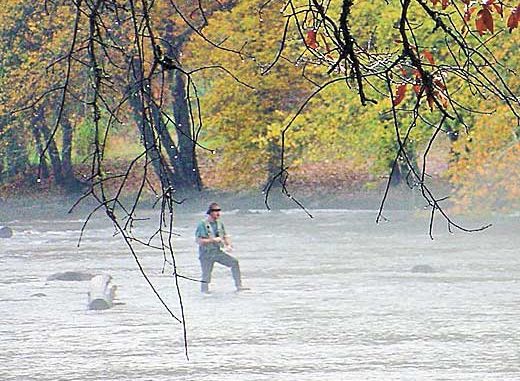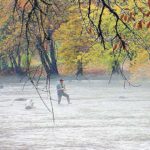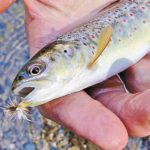
I’m hunkered under the wide limbs of a giant hemlock, waiting out a hard, pounding, gully-washer kind of rain. This old tree is trying its best to shelter me, but the rain too quickly finds me.
Water drips down my face and down my collar. In a few minutes, I’m soaked. Might as well be out in the open. My rain jacket is in my car, a good quarter-mile away.
The rain started with a light sprinkle that I ignored because I was in a nice stretch of stream that I hadn’t completely worked. Maybe if I had sought shelter before the hard rain began, I’d be only a little wet instead of a whole lot wet. One of these days, I’m going to learn to look at the sky before I get in the water.
A kingfisher eyes me from a limb across Little Cataloochee Creek, cocking his big head with the bad haircut before he dives to the stream and retrieves a small fish. He returns to his limb and gives me another look. I know what he’s thinking. I’ve got a good mind to throw in over him.
I squat under that hemlock for 30 minutes, waiting for the rain to ease up. It stops as abruptly as it started, as if someone closed a spigot. It’s 2:30 p.m. I’ve been here an hour, and I haven’t caught a trout.
From the bridge below the campground, I work downstream, starting with a small Mepps Aglia. It doesn’t raise anything, but I have a lot of confidence in Mepps. It snags in a deep pool, and I can’t get it loose without swimming, so I break the line and look for another lure. It’s the only one I have with a single hook, and I didn’t bring a tool to cut off extra hooks. My choices are a Rooster Tail or Panther Martin. I tie on a black Rooster Tail; the Panther Martin is too gaudy.
Two casts later, I catch my first trout, a 7-inch rainbow. It’s a pretty fish, but too small. I let it go. I catch five more rainbows, all small — none larger than eight inches.
By 4 p.m., I’ve caught eight trout, but I’ve let all of them go, my creel is still empty, and I’m thinking about a nice dinner: trout fried crisp and brown in peanut oil, or maybe marinaded and grilled, or baked in white wine and Worcestershire sauce. I get ravenous thinking about it.
Small trout make mighty fine eating, but it would take four to five 7- or 8-inchers to make a meal. If I could catch two 10- or 12-inchers, that would be plenty, and I wouldn’t have to kill as many fish.
In a small pool where a rock divides the current, I catch a brown trout, another 8-incher. It’s beautifully marked. The rose moles on its sides seem to glitter. I return it to the stream.
I fish the large pools, confident that big trout are waiting in the depths. I’m losing confidence in the Rooster Tail, though. It seems to be stuck on 8-inch trout. I’ve heard of big trout coming out of this stream in this snug-harbor valley in the Great Smoky Mountains National Park. I’ve seen pictures of trout that took two arms to hold. If I hit every pool and fish it up and down and crossways and sideways, maybe one of the big boys will grab my lure, and I, too, will have a story of a mighty struggle to tell.
The farther I go, the smaller the trout. I catch a couple of feisty 4-inchers that are barely bigger than my lure. In a year or so, they’ll be jerking arms out of sockets.
Across the stream, behind a large flat rock, is a table-sized pool. It’s an easy cast, but there’s a tangle of wild grapevines on a limb about five feet above the pool. If I’m very careful, I can drop that lure at the top of the pool. I cast, and, sure enough, the line lands on limb, and the lure plops into the middle of the pool instead of at the top where I wanted. It’s not the worst cast of the day, but it certainly ties with a bunch of bad ones. I try to ease the lure up into the tree limb so I can flip it out. When I turn the crank, something flashes, and, to my surprise, I’ve got a fish on. The line pulls free of the limb, and as I reel in, it’s obvious I’ve finally got a keeper. It’s another brown trout, and it stretches almost to the 12-inch mark on my creel.
This is the eating-size trout I’ve been looking for, and it’ll certainly make a fine meal, but before my stomach realizes what’s happening, I place it back in the water and watch it dart away. Wild brown trout are just too beautiful to kill. It’s 5:15. I still have time to catch my dinner.
I continue downstream, catch more trout, probably a dozen or more, but still no dinner. At 6:30, I make my final cast, which actually turns into about a dozen final casts, and leave the stream, climb the high bank to the road, and begin the 4-mile walk to my car.
Yesterday, I made a pot of fresh-vegetable soup. I think about how good that soup will taste in an hour or so. I’ll bake a cake of cornbread with this Quaker cornmeal recipe I found that makes my cornbread come out as close to my Aunt Edith’s as I can ever hope to get. I’m wet from head to feet. I’ve got scratches on my arms and face, a sore rear from falling in the water, but all I think about as I walk up the road is that hot soup and cornbread and what an absolutely wonderful day I’ve had.






Be the first to comment